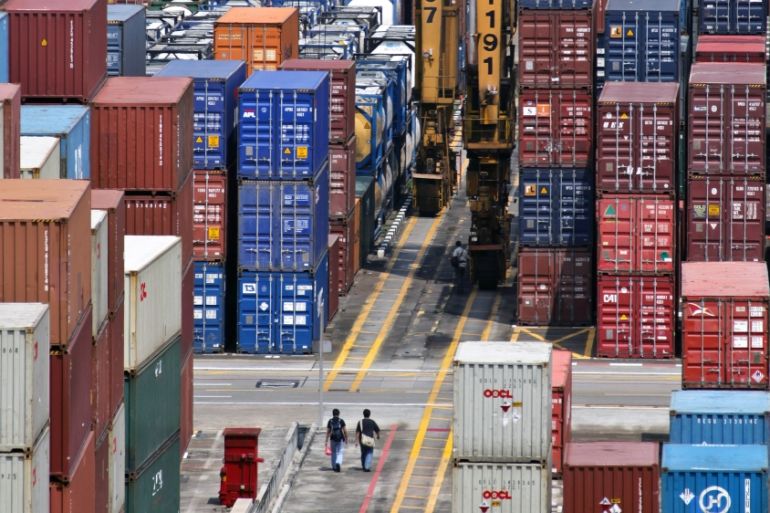Plunge in Singapore’s exports highlights Asian economic troubles
Analysts blame a fall in demand from China as it adjusts to an ongoing trade war with the United States.

A steep drop in exports from Singapore, one of the world’s most trade-dependent economies, is an indicator of the troubles facing many Asian countries because of the trade war between the United States and China, analysts said on Monday.
The Southeast Asian country’s exports, excluding oil, fell 15.9 percent in May compared with the same month last year, according to Enterprise Singapore, a government body that tracks trade figures. It was the biggest decline since March 2016, and partly driven by a fall in demand for electronics, one of Singapore’s main manufacturing industries.
Keep reading
list of 4 itemsPolitics and convenience drive Mexico to be US’s top trading partner
Will Xi and Biden mend US-China relations at the APEC summit?
UK warns of Russia laying ‘sea mines’ to deter Black Sea cargo ships
Compared with April, Singapore’s exports grew by 6.2 percent in May.
“Geographically, exports to the Greater China area [mainland, Hong Kong and Taiwan] contributed most to the decline,” CMC Markets analyst Margaret Yang Yan said in a research note.
“This reading came in line with an 8.5 percent slump in China’s total imports in May. As trade tensions show no sign of easing soon, a slowing of China’s demand will continue to have [a] big impact to South East Asian economies,” she wrote.
Global electronics slump
The drop in Singapore’s exports also reflects a global fall in demand for electronics, said Robert Carnell, chief economist and head of research for the Asia-Pacific region at Dutch bank ING, in a research note.
“The trade war is damaging Asia, but it is the global technology slump (of which China’s technology war with the US is only a recent part) which is doing the most damage to exports in the region,” Carnell said.
Last month Singapore cut its 2019 economic growth forecast to between 1.5 percent and 2.5 percent. Its economy grew at the slowest pace in a decade in the first quarter, hit by a contraction in manufacturing as the China-US trade dispute intensified.
According to the latest available World Bank figures, exports of goods and services amounted to more than 173 percent of Singapore’s gross domestic product in 2017. Only Luxembourg and Hong Kong’s economies were more dependent on exports.
Jeff Ng, an economist at Continuum Economics, noted that Singapore mostly exports finished products to China, and currently Chinese demand for such goods is low.
“(Trade tensions) certainly affected confidence. It’s not necessarily the main determinant of weaker growth, but it has affected businesses’ confidence,” Ng told the Reuters news agency.
On May 10, Trump hiked tariffs on $200bn of Chinese goods up to 25 percent and took steps to levy duties on an additional $300bn in Chinese goods. Beijing retaliated with tariff hikes on a revised list of $60bn in US goods.
A Chinese foreign ministry spokesman said last week that China will respond firmly if the US insists on escalating trade tensions.
A day earlier, US President Donald Trump said he would slap tariffs on the additional $300bn worth of Chinese goods if a deal to resolve trade tensions is not reached when G20 leaders gather in Osaka, Japan later this month.